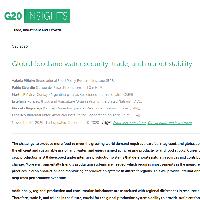Resumen
-
The challenge to produce more food to meet the growing world demand requires a careful, integrated, and global approach to secure
the efficient and sustainable use of land, water, and energy aimed at increasing productivity and food supply. Currently, in many regions,
crop production is still developed under intensive production systems that deteriorate natural resources and contribute to climate
change. More environmentally friendly production systems are needed, which requires improvements in the measurement of sustainable
practices in crop production and monitoring of production systems in different regions. This will provide international comparisons and
help track performance over time.
Additionally, regional production and consumption imbalances are associated with regional differences in resource endowments.
Therefore, trade is, and will be in the future, crucial for the global production system’s ability to provide sufficient food to meet food
security sustainably. However, the global trade of agricultural products continues to be seriously limited by trade policies and could be
worsened by new measures implemented by some countries during or after the COVID-19 crisis. Therefore, the G20 should promote
policies and measures to facilitate dialogue and information exchange on supply and demand. This can foster agreements among food
trading partners based on a more open trading system that can reconcile both objectives: global food security and environmental
sustainability.
